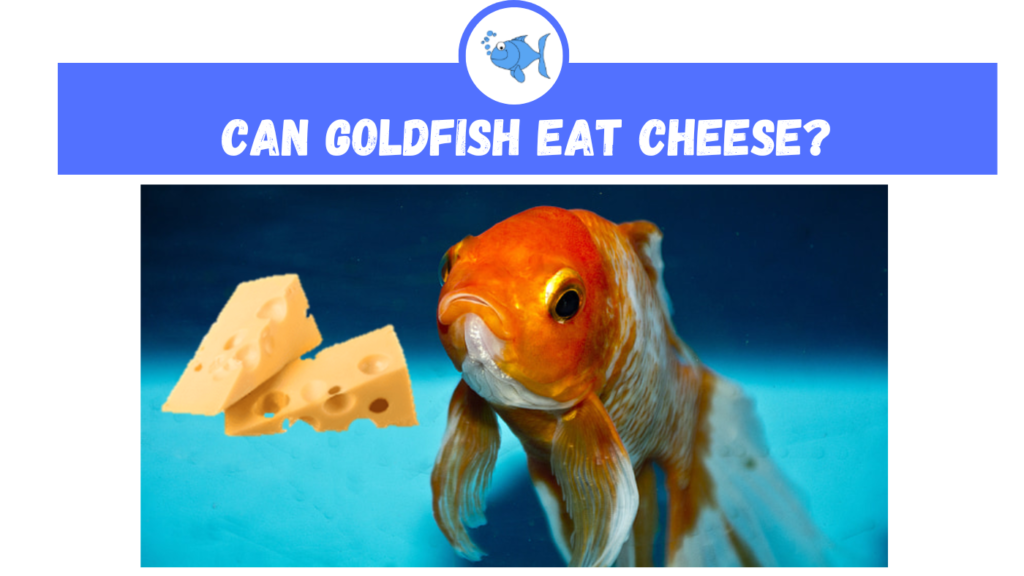Goldfish are beloved freshwater fish that have been kept as pets for centuries. As responsible goldfish owners, it’s important to provide a well-balanced diet to ensure their health and happiness.
When it comes to feeding goldfish, there are several food options available, but what about cheese? The answer is No! Goldfish should not eat cheese as it will cause a nutritional imbalance and is likely to cause sickness.
Understanding The Goldfish Diet
Goldfish are omnivorous, meaning they can eat both plant-based and animal-based foods. In their natural habitat, goldfish primarily feed on aquatic plants, insects, small crustaceans, and larvae. In captivity, it’s important to replicate their natural diet to maintain their well-being.
While your goldfish will likely eat anything in the tank, including rocks, it’s important to keep a close eye on their diet.
Cheese and Goldfish
While goldfish have a diverse diet, cheese is not a suitable food for them. Goldfish have specific nutritional requirements that are best met through a balanced diet of fish flakes or pellets formulated specifically for goldfish. These commercial foods are designed to provide the necessary nutrients, vitamins, and minerals to support the growth and health of goldfish.
Potential Risks of Cheese to a Goldfish
Feeding cheese to goldfish can pose several risks to their health and well-being. While cheese may be a tasty treat for humans, it is not suitable for goldfish due to the following reasons:
High Fat Content
Cheese is known for its high-fat content, which can be detrimental to goldfish. Goldfish have a relatively short digestive system, and they are not equipped to handle excessive amounts of fat in their diet.
Consuming high-fat foods like cheese can lead to digestive issues, including bloating, constipation, or even fatty liver disease. These conditions can severely impact the overall health and vitality of your goldfish. It can also cause your goldfish to start shaking.
Excess Sodium Levels
Cheese is often high in sodium, which can disrupt the delicate balance of internal systems in goldfish. Sodium plays a crucial role in maintaining proper fluid balance within the body, but an excessive amount can lead to dehydration and electrolyte imbalances.
Goldfish are freshwater fish, and their bodies are adapted to a low-sodium environment. Feeding cheese, which is typically high in sodium, can cause stress and negatively affect their overall health. If your goldfish gets stressed out, they might develop red streaks on their tail.
Lactose Intolerance
Goldfish lack the necessary enzymes to properly digest lactose, a sugar found in milk and dairy products like cheese. Feeding cheese to goldfish can result in lactose intolerance and gastrointestinal discomfort.
This discomfort can manifest as bloating, gas, diarrhea, or other digestive issues. It’s important to remember that goldfish have different digestive systems compared to mammals and are not equipped to process lactose effectively.
Nutritional Imbalance
Feeding cheese as a primary or regular part of a goldfish’s diet can lead to nutritional imbalances. Goldfish require specific nutrients, vitamins, and minerals in appropriate proportions to support their growth and overall health. Cheese does not provide the necessary balance of essential nutrients required by goldfish.
Relying on cheese as a food source can lead to deficiencies in crucial elements that are vital for the proper functioning of their organs, immune system, and overall well-being.
Optimal Goldfish Diet
To ensure the well-being of your goldfish, it’s best to focus on a diet that consists of high-quality fish flakes or pellets specifically formulated for goldfish. These foods are nutritionally balanced, providing the necessary proteins, carbohydrates, vitamins, and minerals that goldfish require for optimal growth and health.
Supplementing their diet with occasional treats like freeze-dried or frozen foods, such as bloodworms or brine shrimp, can add variety and enrichment to their feeding routine.
Importance of Water Quality
Feeding a proper diet is just one aspect of maintaining goldfish health. Water quality is equally important. Regular water changes, proper filtration, and monitoring of water parameters such as temperature, pH, ammonia, and nitrite levels are crucial for the well-being of goldfish. Clean water helps support their immune system, digestion, and overall vitality.
Observing Goldfish Behavior
Keeping a close eye on your goldfish’s behavior and overall health is essential. Healthy goldfish are active, have clear eyes, vibrant colors, and exhibit normal feeding behavior.
If you notice any changes in their behavior, appetite, or physical appearance, it may indicate an underlying issue. Consulting with a knowledgeable aquatic professional or a veterinarian experienced in fish care can help address any concerns and ensure the well-being of your goldfish.
Conclusion
While goldfish are omnivorous and have a diverse diet, it’s important to provide them with foods that meet their specific nutritional needs. Cheese is not suitable for goldfish and should be avoided due to its high fat, sodium, and lactose content.
Optimal goldfish nutrition is best achieved through a balanced diet of commercial fish flakes or pellets formulated for goldfish. By prioritizing their dietary requirements and maintaining proper water quality, you can help ensure the health and longevity of your goldfish companions.
